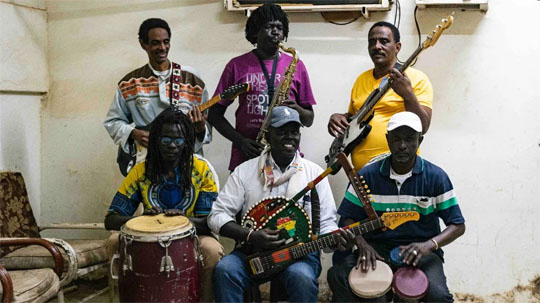|
Any Westerner whoís heard music of the Beja people, who live near Port Sudan, a city located on Sudanís Red Sea coast and responsible for perhaps 90% of Sudanís trade, discovered it via a 1995 CD release titled Rain in the Hills: Beja Ballads of Port Sudan. The album, released on the late John Storm Robertsí frustratingly defunct label Original Music featured solo oud laments as well as tunes played on the basankoob, a Beja lyre that goes by a variety of names and is played in a number of fashions from Eritrea to Kenya, Uganda to Ethiopia. On Rain the Hills, Mohamed Badri Hussanís solo vocal and basankoob performances are true heartbreakers, and show music that seems as if on a different planet from the Arabic pop song then coming out of Khartoum. Mostly recorded in Oxfam employee John Lowís house in Port Sudan, the woefully out of print disc is a crucial listen for anyone interested in music from near East Africaís horn.
The hype surrounding Beja Power! is in part due to the claim that the Ostinato release is the first international release of Beja music; however, the above reference to Rain in the Hills proves that assertion dead wrong. Yet, what the label has done is given this music the largest Western audience itís likely to have. It has also introduced a hybrid instrument, the tambo-guitar, a combination electric guitar and tambour (aka the basankoob). Also, the music on Beja Power! differs radically from the OM release as itís electric, vocal-free, and played by a band that includes hand drummers, a sax, a second guitar and bass. Noori, the tambo-guitarist, sails over the albumís six tracks as the band rides subtle, breathtaking vamps. To hear it is to note connections to Eritrean Tigray, Sudanese Shaigiya, or even slight, coincidental hints of guitar music from Agadez, Niger. Yet it sounds exactly like none of the above.
Noori apparently built his instrument from a tambour given to him by his father and a guitar neck he scored in a Port Sudan scrap yard. Over the years, Sudanís now-ousted dictator Omar al-Bashir attempted to wipe out Beja language and culture, which means what Noori and his bandmates are doing is arguably an act of defiance as their culture is still underserved by the new government.
But what one does or doesnít know about Sudan or Beja culture will not hinder oneís ability to dive deep into this album, which is stunning from start to finish. Rhythmically, the tracks here have common ground with Dhaanto, a Somali rhythm sometimes mistaken for reggae. Noori and sax player Naji Mahmoud Dean Jabar trade licks, one player referencing a songís central riff while the other solos. At times, as on ďJabana,Ē Jabarís sax sounds like Ethiopiaís late sax Negus, Getachew Mekurya, as it meanders atop a minor key melody. On this track, the band drops out and allows the two soloists to engage over the albumís most somber track. The tambour strumming on ďWandeebĒ comes closest to Tsehaytu Berakiís krar playing from the 1970s, showing again how connected Beja people are to their neighbors in Eritrea.
Ostinato has done tremendous labor in unearthing everything from Abu Obaida Hassanís tambour-driven hypnosis to being the first label to release contemporary music to the world from Djibouti. In general, their work in and around the horn of Africa has been indispensable, and Beja Power! is absolutely essential.
|
